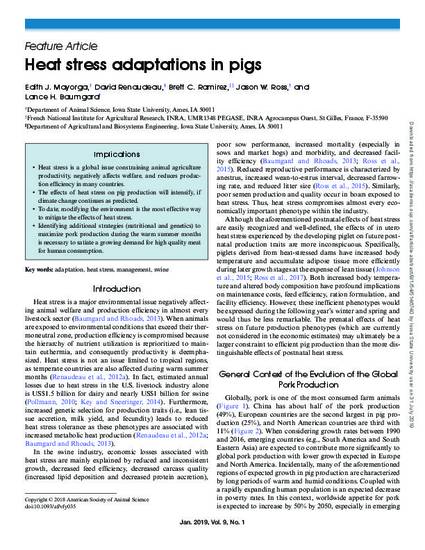
Article
Heat stress adaptations in pigs
Animal Frontiers
Document Type
Article
Disciplines
Publication Version
Published Version
Publication Date
1-1-2019
DOI
10.1093/af/vfy035
Abstract
Implications
• Heat stress is a global issue constraining animal agriculture productivity, negatively affects welfare, and reduces production efficiency in many countries.
• The effects of heat stress on pig production will intensify, if climate change continues as predicted.
• To date, modifying the environment is the most effective way to mitigate the effects of heat stress.
• Identifying additional strategies (nutritional and genetics) to maximize pork production during the warm summer months is necessary to satiate a growing demand for high quality meat for human consumption.
Access
Open
Copyright Owner
American Society of Animal Science
Copyright Date
2018
Language
en
File Format
application/pdf
Citation Information
Edith J. Mayorga, David Renaudeau, Brett C. Ramirez, Jason W. Ross, et al.. "Heat stress adaptations in pigs" Animal Frontiers Vol. 9 Iss. 1 (2019) p. 54 - 61 Available at: http://works.bepress.com/brett-ramirez/17/

This article is published as Mayorga, Edith J., David Renaudeau, Brett C. Ramirez, Jason W. Ross, and Lance H. Baumgard. "Heat stress adaptations in pigs." Animal Frontiers 9, no. 1 (2018): 54-61. DOI: 10.1093/af/vfy035. Posted with permission.